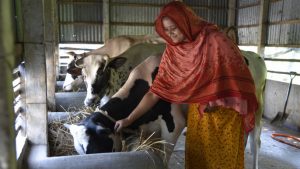One of the biggest dairy companies in Canada will increase prices by up to 15 per cent in the new year as it deals with ballooning manufacturing costs, including a coming spike in the cost of milk.
Lactalis Canada Inc. — part of the French multinational dairy processing giant that owns the Beatrice, Astro yogurt and Black Diamond brand names, among others — informed retailers earlier this month that the price increases are necessary because labour, ingredients, packaging and transportation costs have all risen.
The price hike is part of a broadening trend in the food industry amid a steep rise in inflation this fall. Some of the country’s largest supermarket chains this week reported that a growing number of suppliers are pushing to increase their prices. But it’s still unclear just how much of the increases at the wholesale level will cascade down to customers, who are already contending with a near-record-setting jump in the consumer price index.
Lactalis Canada chief executive Mark Taylor said the 15 per cent increase represents the “upper rate” of the coming price increases, which will vary depending on how much milk goes into the product. The move to boost prices in the new year is partially in response to a forthcoming increase in the price that farmers get for their milk, he said in a statement Friday.
The Canadian Dairy Commission (CDC), which establishes the “farm-gate” price under the national supply management system, last month announced a historic 8.4 per cent increase on raw milk and 12.4 per cent for butter. The increase, which requires approval from the provinces, will help farmers cope with rising costs for livestock feed, fuel and equipment.
Mathieu Frigon, chief executive of the Dairy Processors Association of Canada, said inflation rates on dairy products have stayed substantially lower than overall food inflation over the past decade as dairy companies have worked to absorb rising input costs through efficiencies and narrowing margins. But all the cost increases can’t be absorbed.
Lactalis had to raise its rates “as a result of these regulated increases and inflationary costs,” Todd Johnston, vice-president of customer sales, said in a Nov. 4 letter obtained by the Financial Post. (Lactalis declined to comment on “private and confidential” communications with customers.)
Gary Sands, senior vice-president of the Canadian Federation of Independent Grocers, said smaller retailers — which are also experiencing upticks in labour, energy and transport costs — won’t be able to absorb all the increases.
“Retail will have to pass this cost on. There’s just no doubt about that,” he said. “It’s the retailer who’s left holding the bag of milk explaining to the customer why prices went up 15 per cent.”
The Retail Council of Canada, a trade association representing the big grocers, said “price surges of such a large degree are particularly concerning given that dairy products are essential for Canadian families,” but it’s up to the grocers to decide how much of the increase to pass onto consumers.
“An increase of the magnitude … will certainly affect consumer prices,” spokesperson Michelle Wasylyshen said in an email. “Whether it will be a one-for-one relationship to price remains to be seen and is dependent upon how each grocer approaches the situation.”
Richard Dufresne, chief financial officer of Loblaw Cos. Ltd., said the supermarket chain has “a thorough process to vet pricing requests” from suppliers.
“We work hard to negotiate those increases down so that we offer our customers the best value,” he said on an earnings call Wednesday.
But Taylor at Lactalis said these are “non-negotiable” price increases.
“Lactalis Canada’s price increase is strictly to cover real costs related to the CDC’s mandatory increase, current market and inflationary conditions,” he said, adding that the company shares consumers’ concerns about rising prices and is taking all steps to mitigate future impacts.
“The scale of these pandemic-linked cost rises and material shortages leaves no room for compromise if Canada is to have a resilient and sustainable food supply chain.”













